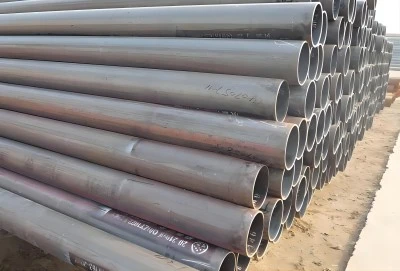S235 steel pipes are widely used in various industries due to their excellent mechanical properties and cost-effectiveness. However, like all steel materials, S235 pipes are susceptible to corrosion and degradation over time. Proper maintenance is crucial to extend their service life and ensure optimal performance. This article will discuss effective strategies for maintaining S235 pipes, focusing on regular inspections to identify early signs of wear, applying surface protection methods such as coatings or paints, and controlling environmental factors like humidity and temperature.
|
|
|
Regular Inspections
Regular inspections are the cornerstone of effective S235 pipe maintenance. By conducting thorough and frequent examinations, you can identify potential issues early and take preventive measures before they escalate into costly problems. Implement a structured inspection schedule, with the frequency depending on the pipe's application and environmental conditions.
During inspections, look for signs of corrosion, such as rust spots, pitting, or discoloration. Pay special attention to welded joints, bends, and areas where moisture can accumulate. Use non-destructive testing methods like ultrasonic thickness measurement to assess wall thickness and detect any thinning due to corrosion. Visual inspections should be complemented with more advanced techniques like magnetic particle testing or radiographic inspection for critical applications.
Document all inspection findings meticulously, including photographs and measurements. This documentation will help track the pipe's condition over time and inform maintenance decisions. If any issues are identified, address them promptly to prevent further deterioration.
Surface Protection
Protecting the surface of S235 pipes is essential for preventing corrosion and extending their service life. One of the most effective methods is applying protective coatings. Choose coatings that are compatible with the pipe's operating conditions and environment. Epoxy-based coatings, for example, offer excellent corrosion resistance and are suitable for many industrial applications.
Before applying any coating, ensure the pipe surface is properly prepared. This typically involves cleaning the surface to remove dirt, grease, and rust, followed by abrasive blasting to create a suitable profile for coating adhesion. Apply the coating according to the manufacturer's instructions, paying attention to recommended thickness and curing times.
In addition to coatings, consider using sacrificial anodes in certain environments. These anodes, made of more reactive metals like zinc or magnesium, corrode preferentially, protecting the S235 pipe from corrosion. This method, known as cathodic protection, is particularly effective in underground or submerged applications.
Environmental Control
Controlling the environment around S235 pipes can significantly impact their longevity. Moisture is one of the primary culprits in pipe corrosion, so minimizing exposure to water and humidity is crucial. For outdoor installations, ensure proper drainage to prevent water accumulation around the pipes. In indoor settings, maintain good ventilation to reduce humidity levels.
Temperature fluctuations can also affect pipe integrity, especially in outdoor applications. Extreme temperature changes can lead to thermal expansion and contraction, potentially causing stress on the pipes and their connections. Where possible, insulate pipes to moderate temperature variations and prevent condensation.
Chemical exposure is another environmental factor to consider. If S235 pipes are used in environments with corrosive chemicals, ensure they are adequately protected or consider using more resistant materials for those specific sections. Regular cleaning to remove any chemical residues can also help prevent corrosion.
Corrosion Protection Systems
Implementing comprehensive corrosion protection systems is vital for extending the service life of S235 pipes. These systems often combine multiple strategies to provide robust protection against various corrosion mechanisms.
Cathodic protection, mentioned earlier, is a key component of many corrosion protection systems. For larger installations, impressed current cathodic protection (ICCP) systems can be more effective than sacrificial anodes. ICCP systems use an external power source to provide protective current, offering more control and longer-lasting protection.
Corrosion inhibitors can also be an effective part of a protection system. These chemicals, when added to the fluid flowing through the pipes or applied to the pipe surface, can significantly reduce corrosion rates. Choose inhibitors that are compatible with the pipe material and the process fluids.
For buried pipes, consider using protective wraps or tapes in addition to coatings. These provide an extra barrier against soil-based corrosion and can be particularly effective in areas with aggressive soil conditions.
S235 Pipe For Sale
When considering the purchase of S235 pipes, it's crucial to select high-quality products from reputable suppliers to ensure reliability and performance in your projects. S235 pipes are available in various sizes and specifications, making them suitable for a wide range of applications, from structural support to pipelines.
When selecting S235 pipes, consider several key factors such as the required diameter, wall thickness, and length based on your specific needs. Additionally, it’s essential to ensure that the pipes meet the necessary industry standards and certifications relevant to your application, which can vary depending on the sector, such as construction, manufacturing, or energy.
Requesting material certificates and test reports is advisable, as these documents verify the pipes' properties and overall quality. They should confirm that the pipes adhere to the S235 grade specifications, including critical aspects such as chemical composition, tensile strength, yield strength, and elongation.
Moreover, evaluating the supplier's reputation and experience in the industry can help you make a more informed decision. A reliable supplier will typically offer comprehensive support, including technical advice and after-sales service, ensuring that you receive not only a quality product but also valuable assistance throughout your project. Prioritizing these factors will lead to a smoother procurement process and ultimately contribute to the success of your endeavors.














